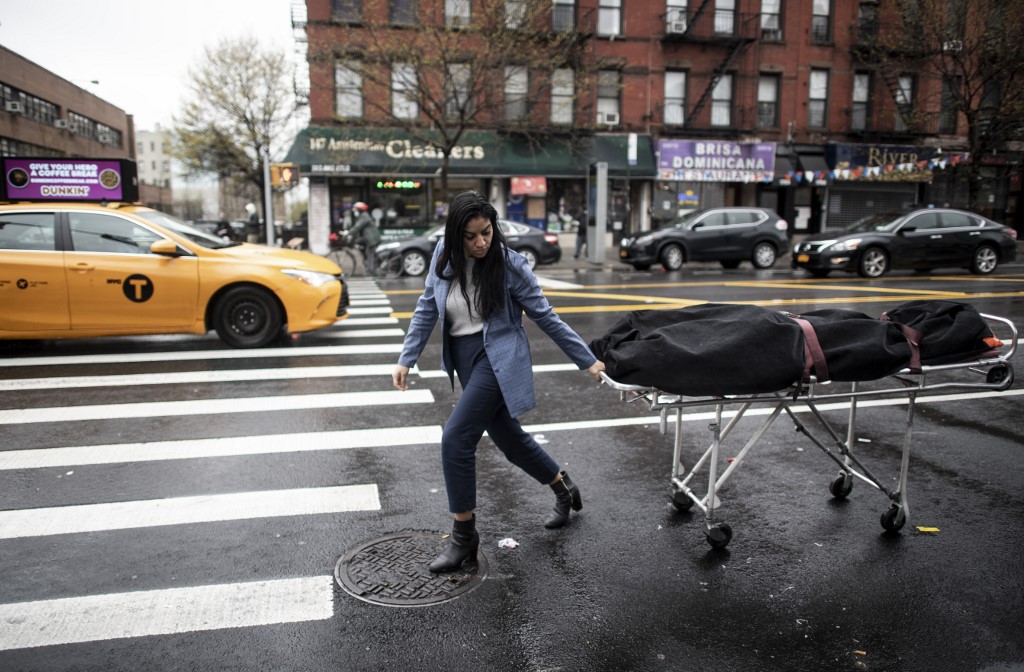More than one million people have died from coronavirus, according to an AFP toll, marking a grim milestone in the spread of the disease that has ravaged the world economy, inflamed diplomatic tensions and upended lives from Indian slums to New York City.

In this file photo taken on April 24, 2020 Alisha Narvaez Manager at International Funeral & Cremation Services transports a body to the funeral home in the Harlem neighborhood of New York City. (Photo: AFP)
In the nine months since the virus was first detected, schools, businesses, live entertainment, and international travel have been upended by strict stay-at-home measures designed to curb the contagion.
Drastic controls that put half of humanity -- more than four billion people -- under some form of lockdown by April at first slowed the spread, but since restrictions were eased, infections have soared again.
By 1100 GMT Monday, the disease had claimed 1,002,036 victims from 33,162,930 recorded infections, according to an AFP tally collected from official sources by journalists stationed around the world, and compiled by a dedicated team of data specialists.
The United States has the highest death toll with more than 200,000 fatalities, followed by Brazil, India, Mexico and Britain.
Behind the figures lie millions of lives shattered by an illness that still holds many mysteries and which cannot yet be effectively treated or prevented, despite a global race to develop drugs and a vaccine.
For Italian truck driver Carlo Chiodi, the global mortality statistics include both his parents, whom he lost within days of each other.
"I saw my father walking out of the house, getting into the ambulance, and all I could say was 'goodbye'," Chiodi, 50, told AFP.
"I regret not saying 'I love you' and I regret not hugging him."
'A crisis like no other'
With new cases again surging worldwide, governments have been forced into an uneasy balancing act: virus controls slow the spread of the disease, but they hurt already reeling economies and businesses.
The IMF has warned that the economic upheaval could cause a "crisis like no other", though the Fund's outlook appears brighter now than it did in June.
Europe, hit hard by the first wave, is now facing another surge, with Paris, London and Madrid all forced to introduce controls to slow infections threatening to overload hospitals.
A million Madrid residents are under partial lockdown, with the city and the surrounding region at the epicentre of Spain's second wave.
In Germany, Chancellor Angela Merkel's spokesman urged citizens to keep to strict hygiene measures.
"The development of infection numbers is of great concern to us," Steffen Seibert said. "We can see from some of our European friends where that could lead."
Masks and social distancing in shops, cafes and public transport are now part of everyday life in many cities around the world.
Mid-September saw a record rise in cases in most regions and the World Health Organization has warned virus deaths could even double to two million without more global collective action.
Infections in India, home to 1.3 billion people, surged past six million on Monday, but authorities pressed ahead with a reopening of the battered South Asian economy.
The virus initially hit major metropolises including financial hub Mumbai and capital New Delhi, but has since spread to regional and rural areas where healthcare systems are even more fragile and patchy.
Santosh, a student in Delhi, said the virus was now "part of our lives".
"You cannot shut down every business, because the economy cannot collapse... Covid-19 is not going to pay the rent."
Currently, nine vaccine candidates are in last-stage clinical trials, with hopes some will be rolled out next year.
Waking up to Covid-19
The SARS-CoV-2 virus that causes the illness known as Covid-19 made its first last year, ground zero of the outbreak.
How it got there is still unclear but scientists think it originated in bats and could have been transmitted to people via another mammal.
By March 11, the virus had emerged in over 100 countries and the WHO declared a pandemic, expressing concern about the "alarming levels of inaction".
The least privileged around the globe have been the hardest hit by the breakneck spread of the virus, which has also infected some among the powerful, rich and famous.
British Prime Minister Boris Johnson spent a week in hospital. Madonna and Tom Hanks also tested positive.
The Tokyo Olympics, Rio's Carnival and the Muslim pilgrimage to Mecca are among the major events postponed or disrupted by the pandemic.
Some major sports tournaments have resumed but with empty stadiums -- such as Premier League football in England -- or highly restricted spectator counts. The French Open is limiting access to 1,000 tennis fans a day.
As the restrictions tighten, protests and anger are rising as businesses worry about their survival and individuals grow frustrated about their jobs and families in the face of another round of curbs.


